The system version 1 (from now on referred as V1) sanctions searches feature is multifaced, including:
- Search Providers;
- Search Profiles;
- Matching Process;
- Updates;
- Re-opening a search.
Search Providers
In order to enable sanctions searches (if not already enabled at the configuration stage), users should first visit the Search Providers page accessed via the Settings menu.
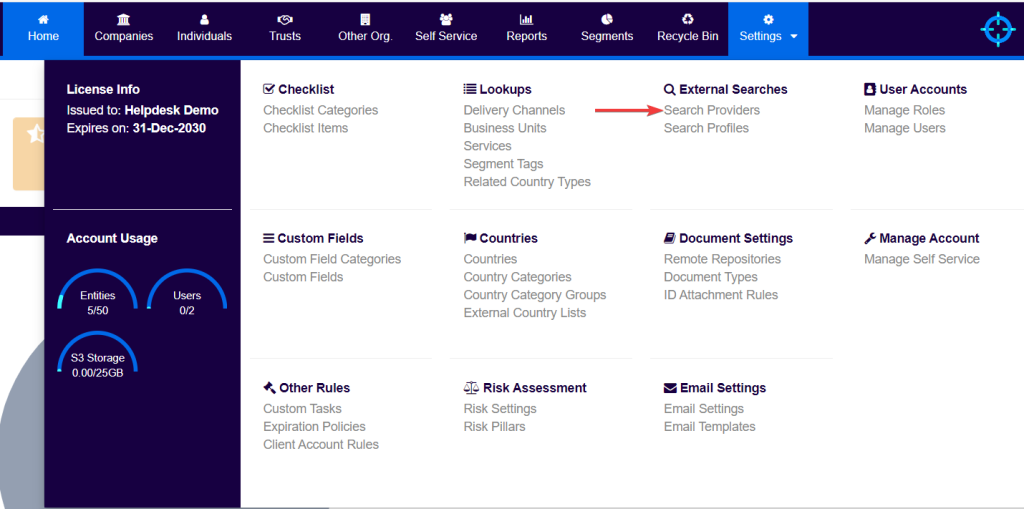
The user will then be redirect to the Search Providers settings, where it will be able to define which providers should be enabled for searches by toggling the Enabled button between YES/NO. The users can enabled Start KYC Monitoring if the system is configured to utilize the service.
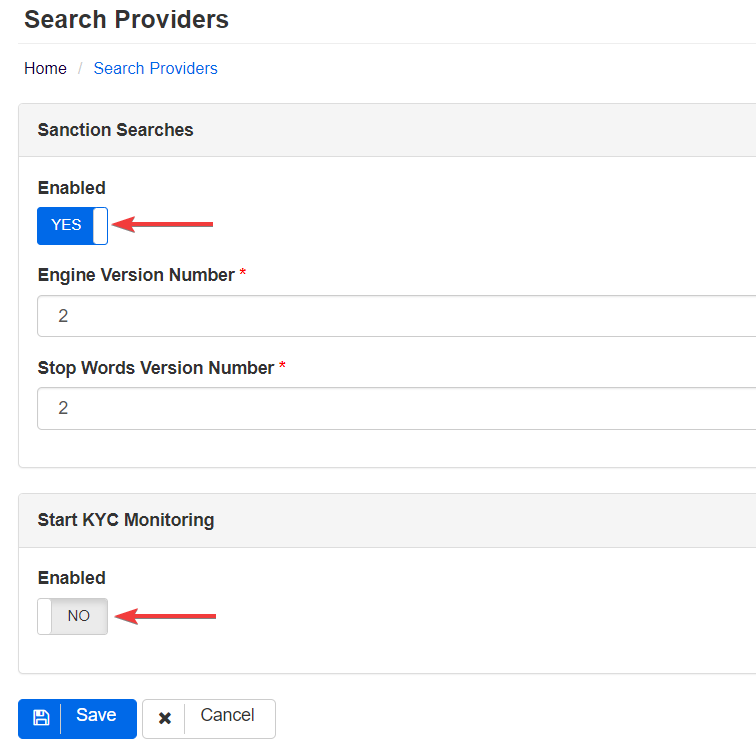
This screen also allows users to defined settings related with Sanction Searches, as which is the Engine Version Number and which Stop Words Version to use, as shown below:

A stop word is a word that is commonly used within the name of a company and therefore ignored by the sanctions matching algorithm (e.g. “ABC Company Limited” is almost exactly the same as “DEF Company Limited” because they both have the words “Company” and “Limited”).
This means that both “Company” and “Limited” are stop words and are not included in the matching process. Thus, the system only compares “ABC” to “DEF” in the sanctions lists.
Whenever there are changes to this list of stop words, there is a new version added, hence why there are multiple to choose from in the Sanction Searches settings.
New environments will always have the latest version of stop words, but InScope-AML’s existing clients won’t have their settings automatically updated, as this could result in potentially undesirable new false hits when the database has already been screened. To select a different version, the users will have to do it manually from the dropdown.
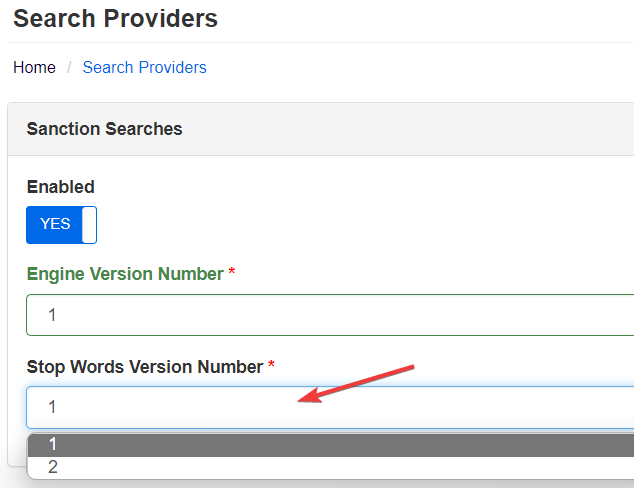
The Engine Version Number refers to the version of the system’s sanctions-matching engine the users wish to use. Presently, versions 1 and 2 are available for selection.
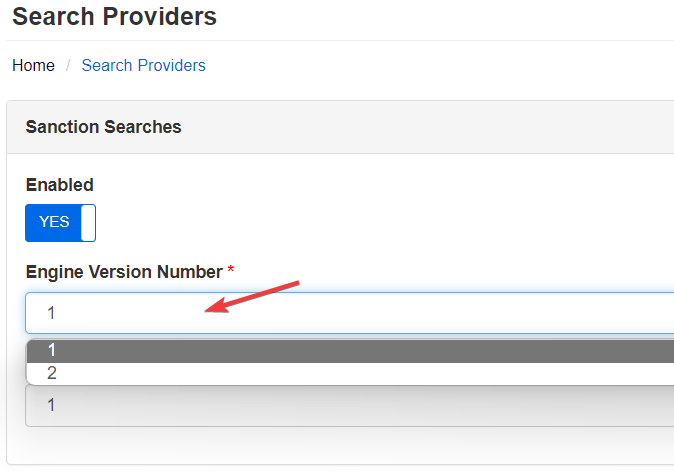
Search Profiles
Search profiles are a grouping of settings that users can choose between within the system, which is accessible through the Search Profiles page consulted via the Settings menu.
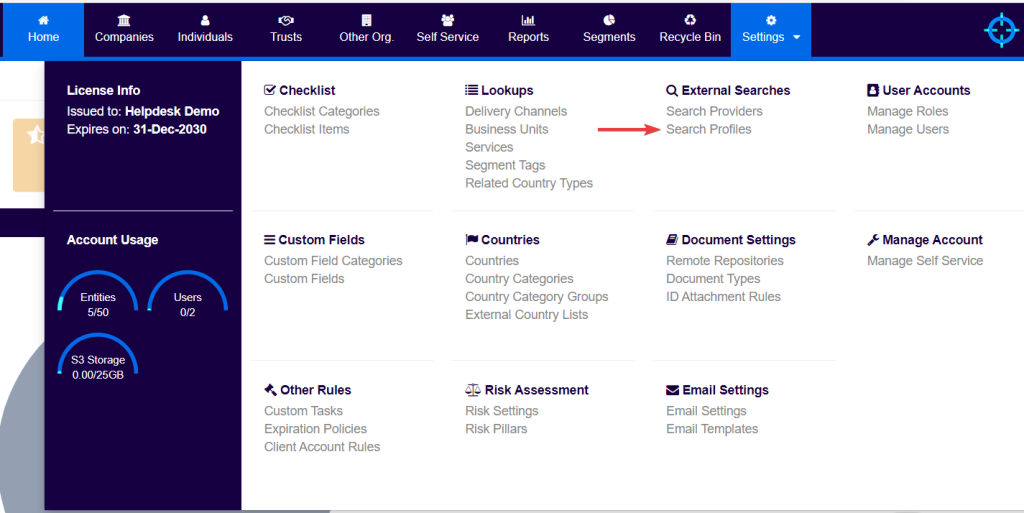
This group of settings dictates the searches that should be performed against the database (i.e. UN, EU, and ARB, which are inbuilt sanctions searches, and Start KYC, if the system is configured to utilize the service) and the relevant matching thresholds, expressed as percentages.
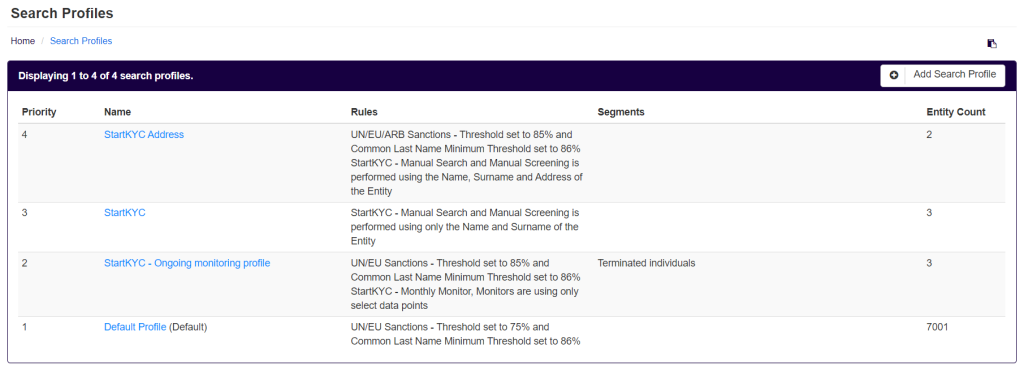
Users are able to create search profiles, by clicking on Add Search Profile, and assign them manually to each entity or automatically using rules.

In the process of adding a new search profile, or whilst editing one already created, the user can select the sanction lists to be checked. Below are all presently available lists:
- UN Sanctions;
- EU Sanctions;
- Malta Asset Recovery Bureau Court Orders.
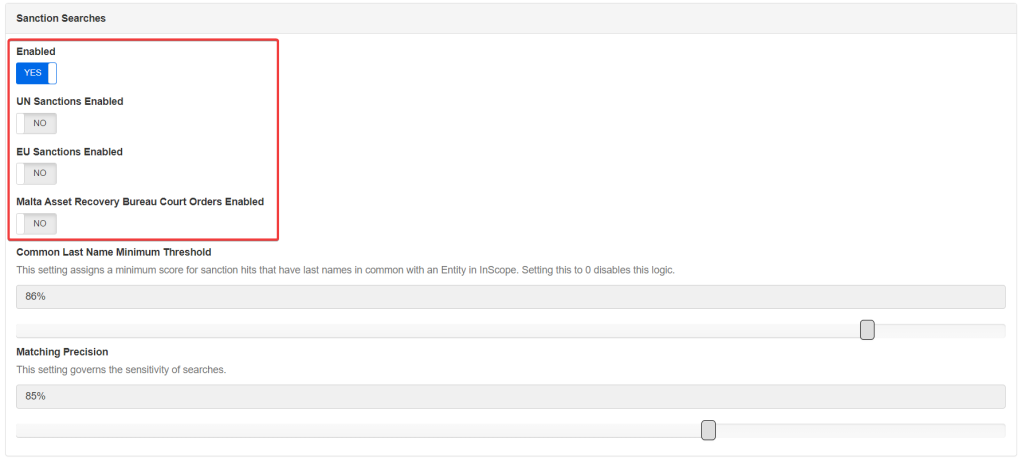
Besides enabling the sanctions lists on a search profile, users can also calibrate the Common Last Name Minimum Threshold. This setting assigns a minimum threshold for sanction hits that have last names in common with an entity in the system. If the user sets it to 0, the logic of such setting is disabled.
Each search profile also has a Matching Precision setting (seen at the bottom of the above screenshot.)
A precision of 100% means that there has to be a perfect match between the details of the entity in the system and the entity on a sanction listing for a potential hit to appear.
Users are advised to set this to an appropriate value, that filters out a lot of false potential matches, but won’t exclude substantially similar potential results.
Internal testing found that a precision of 85% strikes a good balance between false positives and appropriate results, and any update to sanctions screening is tested at this threshold.
However, if users experience too many false positives across the database, or for a particular subset of clients, changing the matching precision can be done to better suit user requirements.
Matching Process
When generating potential matches for individuals, the system takes into account:
- Name;
- Date of birth;
- Country of birth;
- Country of residence;
- Country of nationality; and
- ID details.
However, most of the weight is applied to the name and ID number.
For companies, other organizations and trusts, the system takes into account:
- Name;
- Country of registration; and
- Registration number.
However, most of the weight is applied to the name and registration number.
Ongoing Monitoring
The system sanctions function assists users with ongoing monitoring in the following manner:
- The relevant sanction lists are downloaded nightly following which a check is run against your client database (users can check such logs in the Processes tab in the Home screen, by turning On the Update Sanctions Lists filter, under Filter By Workflow Type.

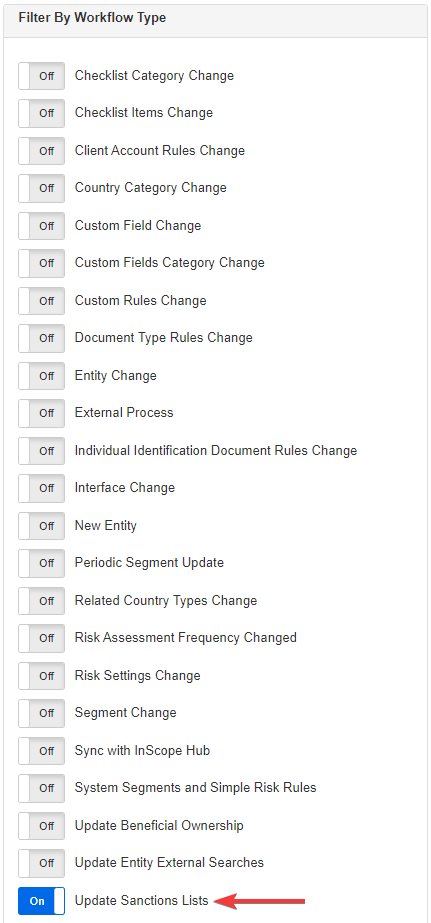
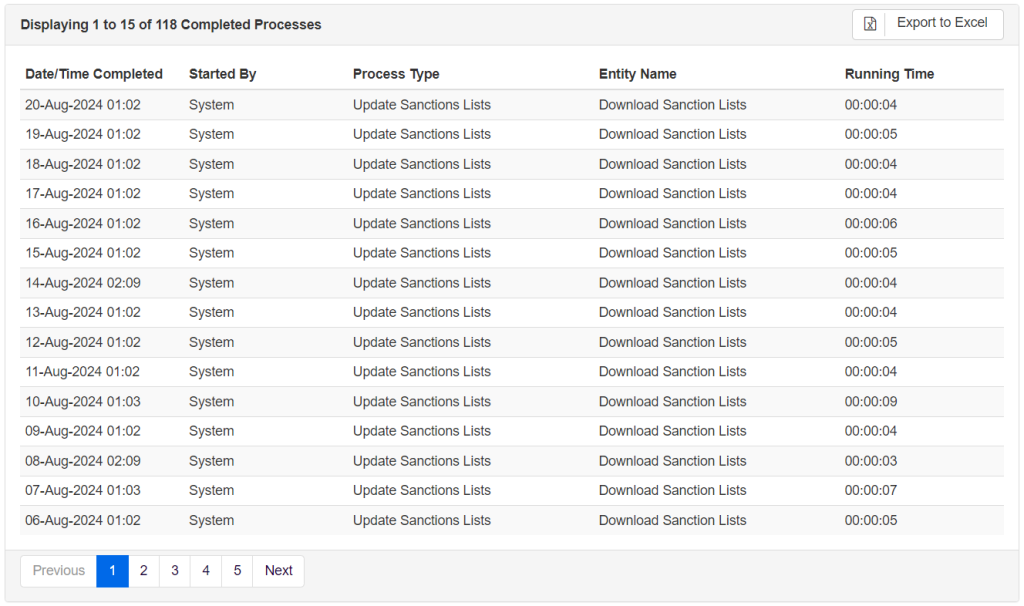
- After the check is performed, any new hits are shown as warnings (both in the Warnings tab in the Home screen, and in the entity’s profile), and highlighted to users.
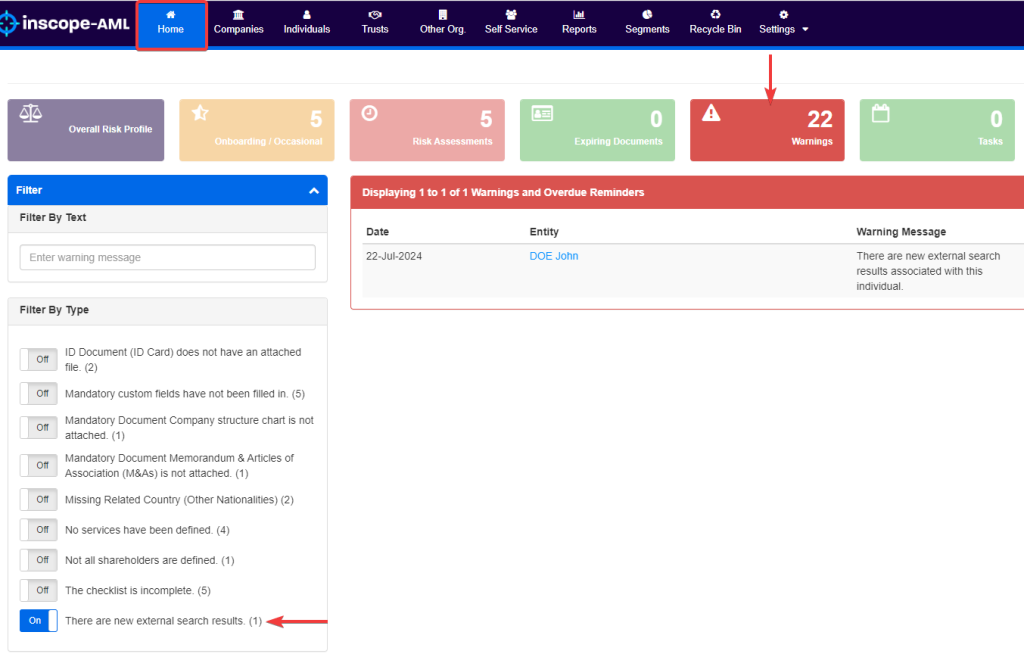
- The warnings highlight the date (1) that the external search hit occurred, and the entity for whom the sanction was matched (2).

Re-opening a Search
There are a number of different reasons why the system may re-open a previously closed search.
The most common reason for a result being re-opened is the details of the entity (e.g. name) changing or when a new potential match is found in a sanction list.
Another reason, however, could be that an existing entry within the relevant sanction list has been modified.
For example, a search may have returned two sanctions potential hits, which were dismissed as false hits. The sanctions list was then updated by the issuing body (e.g. the EU added an alias to the previously issued sanction listing). This will trigger the re-opening of the search.
The way the system picks these changes is through a process denominated as simplified comparison, which takes into account only major changes (e.g. a name change, address change, etc.); and, as a result, a sanction that has been dismissed will not be shown and no warnings will be generated unless one of the following conditions are met.
One of the following changes has occurred to the individual on a sanction list:
- A full name has changed (e.g. an alias added), and the new name has a match of more than 80% with the name of the entity in the system;
- A new country of birth/nationality/residence/etc. has been added that has an apparent match to the entity in the system;
- An identification document number has changed and the new number has a match of more than 80% with the number of the entity in the system;
- A date of birth has been added.
One of the following changes has occurred to the company, other organization or trust, on a sanction list:
- A name has changed (e.g. an alias added) and the new name has a match of more than 80% with the name of the entity in the system;
- An identification document number has changed and the new number has a match of more than 80% with the number of the entity in the system.
For all entities:
If a previously seen sanction had a matching score of 80% and the sanction has since been updated with the new matching score of the sanction being higher than 95%, then the sanction hit is considered as having changed.
For example, consider an individual within the system called “John Smith”. The system would have returned a hit for a sanction on “Elizabeth Smith” with a score of 80%.
An user then changed the name to “John E. Smith”.
The new matching score when compared to the sanction on “Elizabeth Smith” is now 82%.
Since the actual sanction listing has not changed, the search will not be reopened at this stage.
However, if an user changed the name of the individual to “Elizabeth Smith”, the system will calculate the matching score as 100% and, therefore, the search will be reopened, as this change passes the 95% matching score threshold.